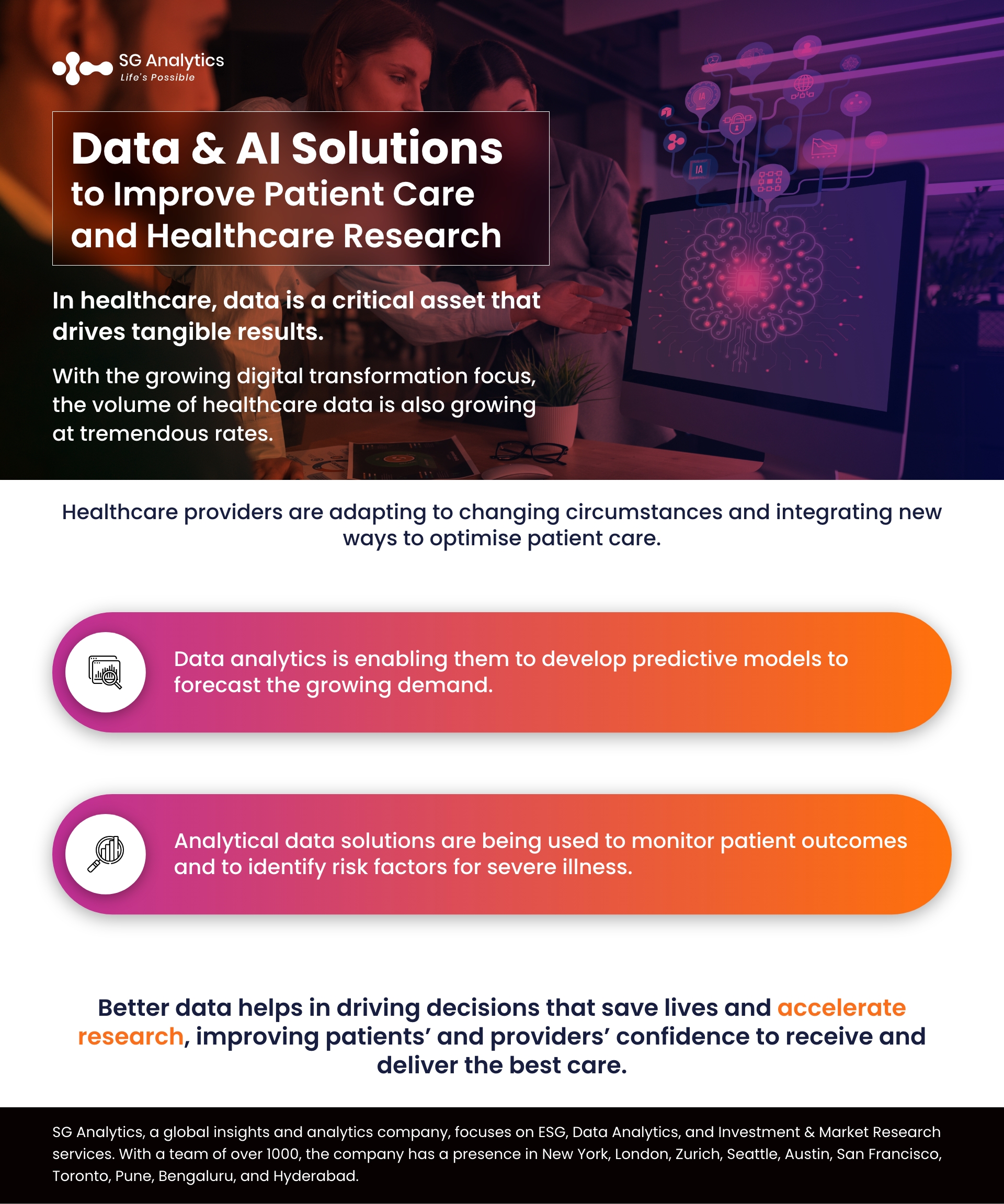Almost 60% of healthcare executives say that digital transformation is the most vital growth driver in the industry. Many large health systems are investing in the cloud as well as remote monitoring and home health. In tandem with this digital transformation focus, the volume of healthcare data is also growing at tremendous rates.
The global spending on data storage in healthcare has grown from $4.88 billion in the year 2022 to $5.7 billion in 2023. It is expected to exceed $10 billion by the year 2027.
While healthcare institutions are significantly investing in storing the medical and patient data they collect and purchase, some are still struggling to make use of this data to enhance operations and patient outcomes.
Read more: Why is Healthcare Data Quality Critical in the Age of AI
Data in Healthcare
Organizations are becoming more reliant on data for making decisions, making the role of data analytics in healthcare become quite prominent.
Big data integrates large data sets with both structured and unstructured data that is further analyzed to find insights, trends, and patterns. Defined volume, velocity, and variety – the high volume of data being generated quickly and consisting of different data types are presenting the healthcare institutions with critical questions.
In healthcare, big data is generated across different sources and analyzed to guide decision-making, enhance patient outcomes, and decrease healthcare costs. The most common sources of big data in healthcare are electronic health records (EHR), personal health records (PHRs), electronic medical records (EMRs), and data produced from digital health tools, including wearable medical devices and mobile health apps.

Healthcare providers are quickly adapting to changing circumstances and integrating new ways to optimize patient care. Data analytics, in numerous ways, enables them to develop predictive models to forecast the growing demand for healthcare services and plan and allocate resources accordingly. Analytical data solutions are being used to monitor patient outcomes as well as to identify risk factors for severe illness, allowing providers to intervene early and improve patient outcomes.
The importance of data analytics and solutions in healthcare can be manifested in various ways – to monitor progress, predict patient outcomes, improve operational facilities, reduce healthcare costs, and much more.
Read more: Big Data and its Impact: How Can Businesses Make the Most of It
The Rise of Generative AI in Healthcare
The industry has also been witnessing the introduction of generative AI capabilities through healthcare chatbots and virtual assistants, offering healthcare intelligence to readily customize and integrate their operations into existing workflows. The bots can leverage insights from healthcare organizations' content sources and utilize generative AI to offer the right solution. Additionally, the bots can source credible information, thereby enhancing their capabilities.
New data and AI solutions designed for the healthcare sector are bringing the power of AI-driven analytics to enhance patient and clinician experiences along the way. Healthcare organizations are implementing trust-driven and responsible AI principles technologies to enable connected experiences at all points of care. To tackle the unique healthcare challenges, institutions are integrating measures to solve data-driven problems across every department, thereby transforming operations.
The new innovations in healthcare are offering industry-specific data solutions and AI services that can be tailored to address specific healthcare challenges. Healthcare is just the first of what I expect will be a long list of industry-tailored solutions. While the impact of AI can already be seen across every industry, leveraging these technologies to obtain much-needed efficiencies in the healthcare industry stands out as an emerging opportunity. An overwhelming amount of data is driving the industry, and everyone can feel the burden of that. To foster a sense of collaboration, healthcare institutions are empowering their workforce and extracting value from clinical and operational data by using industry-relevant data standards.
Organizations understand the potential of their data — from developing value-based healthcare offerings to using advanced imaging models and genomics research for anomaly detection. However, healthcare providers do not have the time or resources to design the underlying infrastructure and utilize the data.

To overcome this situation, healthcare institutions are building their cloud services to address critical and diverse patient needs by turning centralized data into an asset. Organizations are enabling healthcare providers to implement cloud platforms to overcome the complexity of their clinical, operational, administrative, and research data while enhancing accessibility, scaling existing solutions, and innovating faster.
Read more: Navigating Digital Disruption and Innovation in Healthcare
Driving a Data-driven, Cloud-powered Future
In the healthcare industry, data is a critical asset that drives tangible results. Better data helps in driving decisions that save lives and accelerate research, thereby improving patients’ and providers’ confidence to receive and deliver the best care.
And with the introduction of data solutions and cloud transformation framework to drive growth, the industry is witnessing a change in achieving its data objectives. From security, efficiency, and speed to innovation, healthcare teams are specializing in delivering healthcare-specific cloud solutions to meet critical compliance requirements.
To further build and expand the presence of cloud for healthcare providers, organizations are integrating cloud data platforms to support ingestion, transformation, and consumption from multiple medical operations and financial data sources. With a focus on people analytics, primary care, medical group operations, and general operations, the tools offer healthcare staff and clinicians access to critical insights. The cloud foundation also enables specific use cases to leverage data and determine new focus programs to address ambulatory and in-patient needs.
Every organization had different tactical goals for their cloud platforms. Their goals can be underscored by a fundamental need to accelerate the ability to deliver the most accurate care and outcomes. By incorporating leading-edge research and analytics capabilities, the migration of applications to the cloud is further equipping healthcare providers to refactor components of existing applications and design new cloud-native applications. This helps in driving improvements in patient care and research.
Read more: Data Trust Can Be a Competitive Advantage: How?

Final Thoughts
The emerging healthcare-focused data solutions are being designed to unify healthcare data and analytics. This enables healthcare organizations to combine data from different sources, such as electronic health records, labs, and medical devices, to design standardized, scalable solutions for discovering clinical and operational insights to further improve patient care.
The growing significance of new healthcare-focused AI models and new AI-driven tools has enabled institutions to simplify their clinician experience. With patient populations and clinician expectations evolving, there is a growing need for healthcare organizations to integrate the right tools and experience from their technology and service provider partners to provide effective, quality, and differentiated outcomes.
SG Analytics, recognized by the Financial Times as one of APAC's fastest-growing firms, is a prominent insights and analytics company specializing in data-centric research and contextual analytics. Operating globally across the US, UK, Poland, Switzerland, and India, we expertly guide data from inception to transform it into invaluable insights using our knowledge-driven ecosystem, results-focused solutions, and advanced technology platform. Our distinguished clientele, including Fortune 500 giants, attests to our mastery of harnessing data with purpose, merging content and context to overcome business challenges. With our Brand Promise of "Life's Possible," we consistently deliver enduring value, ensuring the utmost client delight.
A leader in the Healthcare domain, SG Analytics is assisting healthcare companies to leverage the power of information. Contact us today if you are in search of efficient Healthcare solutions to make sound business decisions.
About SG Analytics
SG Analytics is an industry-leading global insights and analytics firm providing data-centric research and contextual analytics services to its clients, including Fortune 500 companies, across BFSI, Technology, Media and entertainment, and Healthcare sectors. Established in 2007, SG Analytics is a Great Place to Work® (GPTW) certified company and has a team of over 1100 employees and a presence across the U.S.A., the U.K., Switzerland, Canada, and India.
Apart from being recognized by reputed firms such as Analytics India Magazine, Everest Group, and ISG, SG Analytics has been recently awarded as the top ESG consultancy of the year 2022 and Idea Awards 2023 by Entrepreneur India in the “Best Use of Data” category.

